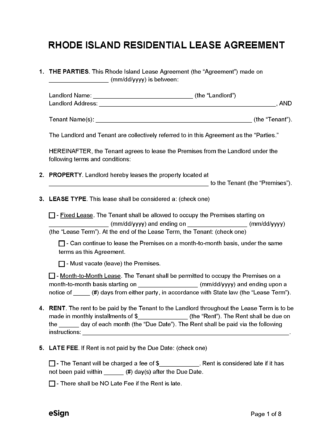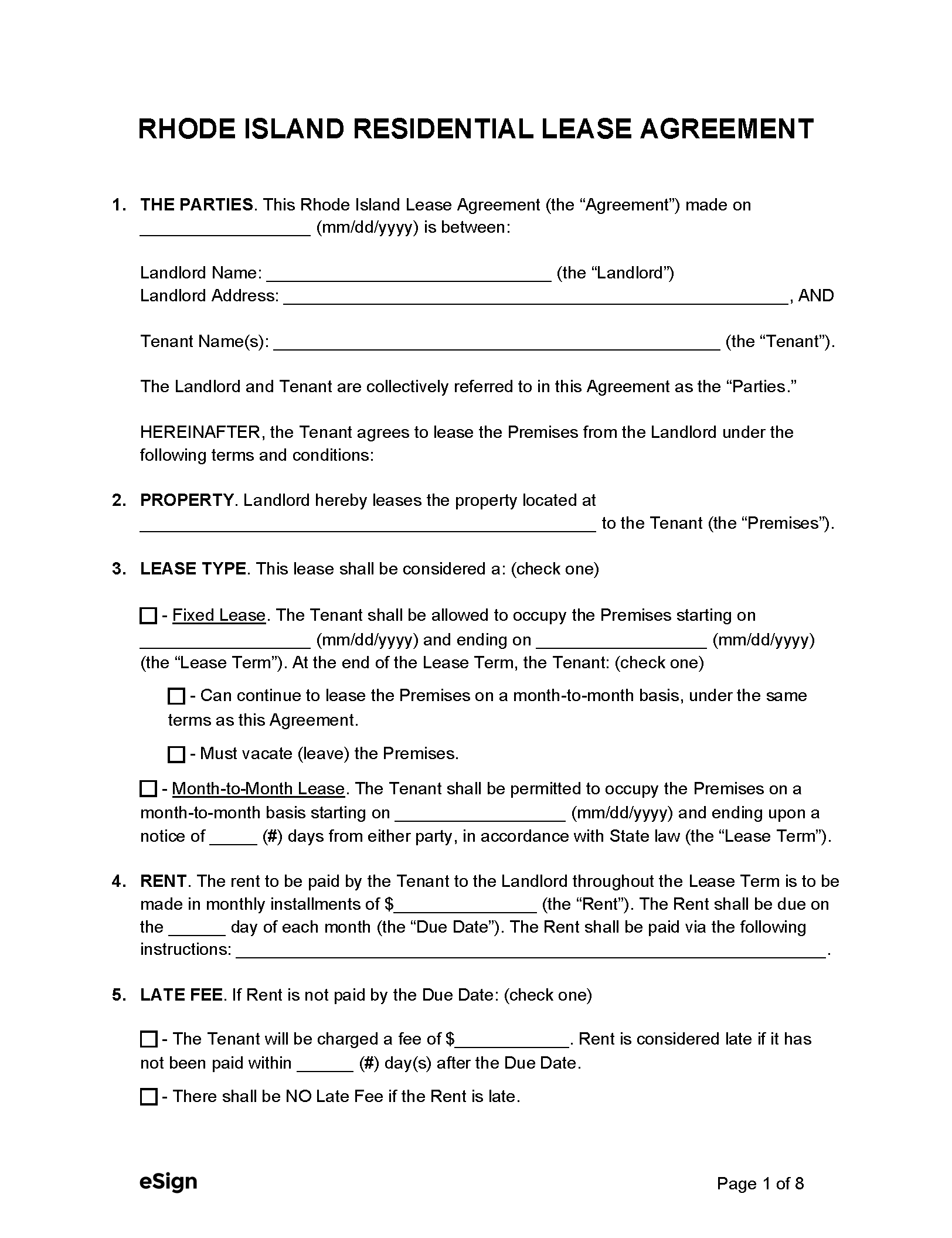Lease Agreements: By Type (6)
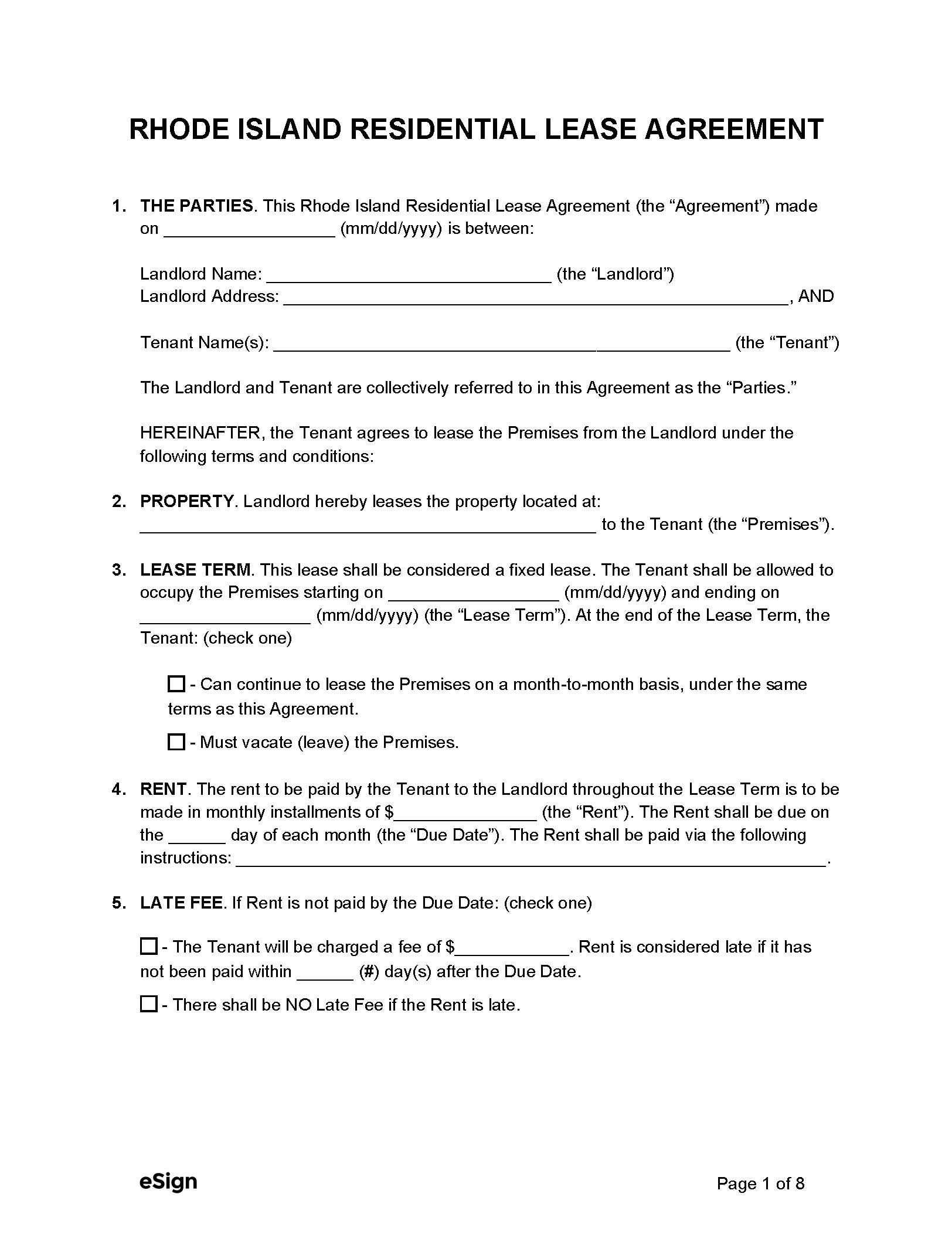 Standard (1-Year) Lease Agreement – A fixed-term contract that permits a tenant to occupy a residential dwelling for one year. Standard (1-Year) Lease Agreement – A fixed-term contract that permits a tenant to occupy a residential dwelling for one year.
Download: PDF, Word (.docx), OpenDocument |
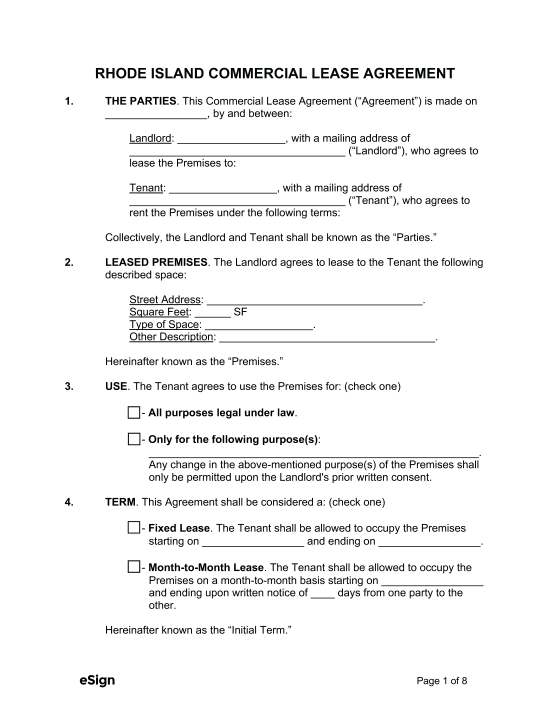 Commercial Lease Agreement – A rental agreement used to lease commercial real estate to a business. Commercial Lease Agreement – A rental agreement used to lease commercial real estate to a business.
Download: PDF, Word (.docx), OpenDocument |
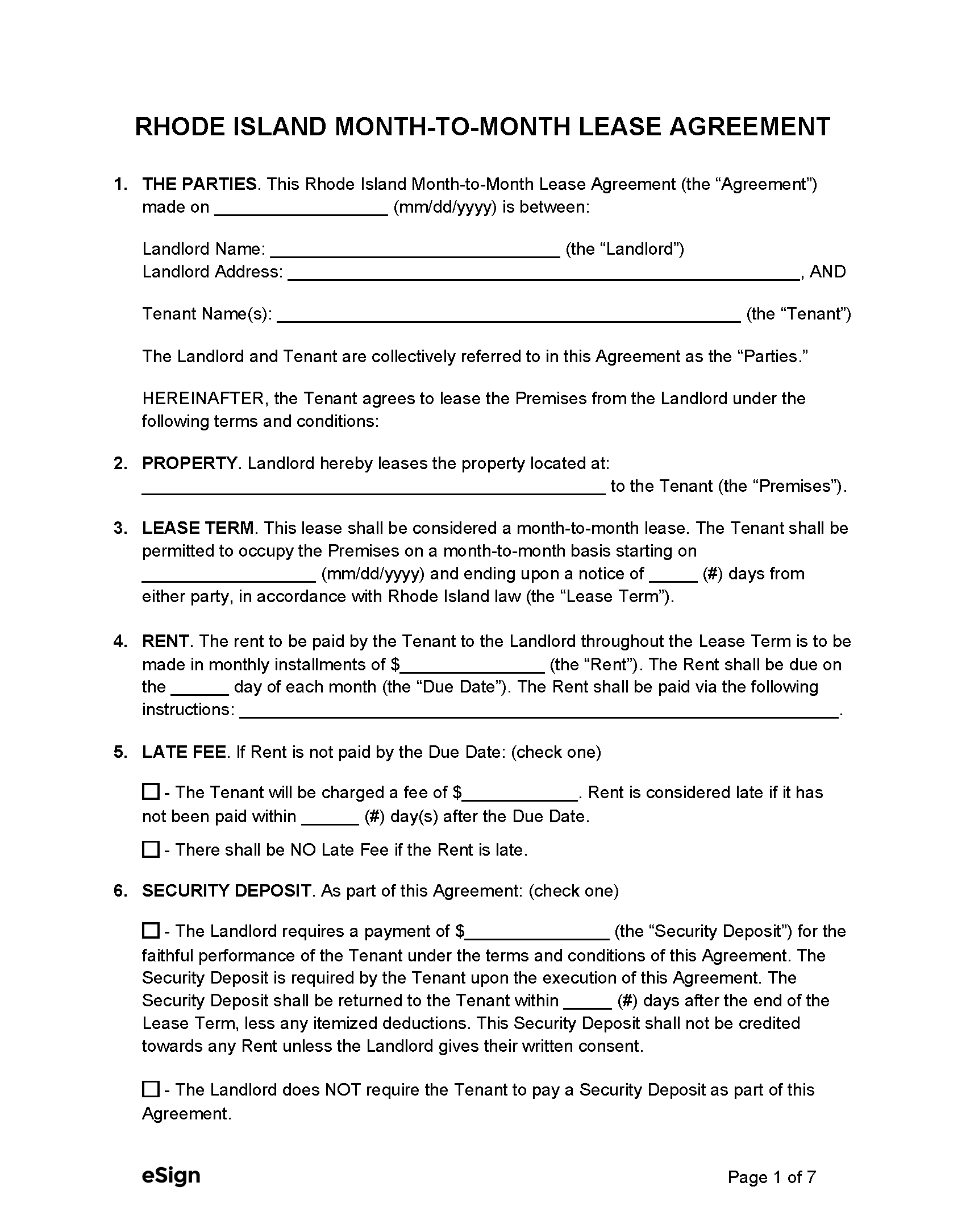 Month-to-Month Lease Agreement – Also known as an “at-will” lease, this rental agreement has no definitive termination date and renews monthly. Month-to-Month Lease Agreement – Also known as an “at-will” lease, this rental agreement has no definitive termination date and renews monthly.
Download: PDF, Word (.docx), OpenDocument |
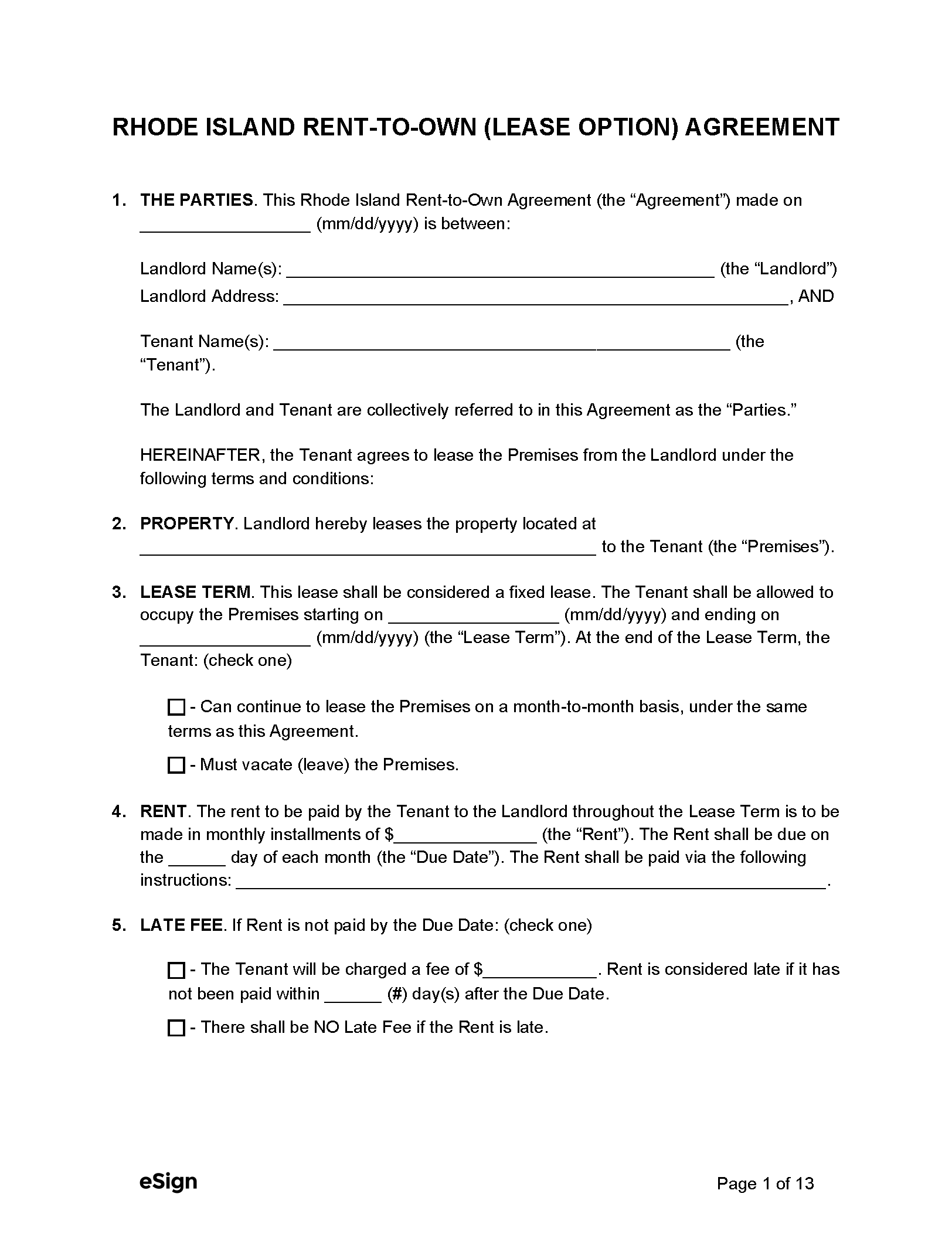 Rent-to-Own Agreement (Lease Option) – A lease that offers the tenant the right to purchase the property before the end of the lease term. Rent-to-Own Agreement (Lease Option) – A lease that offers the tenant the right to purchase the property before the end of the lease term.
Download: PDF, Word (.docx), OpenDocument |
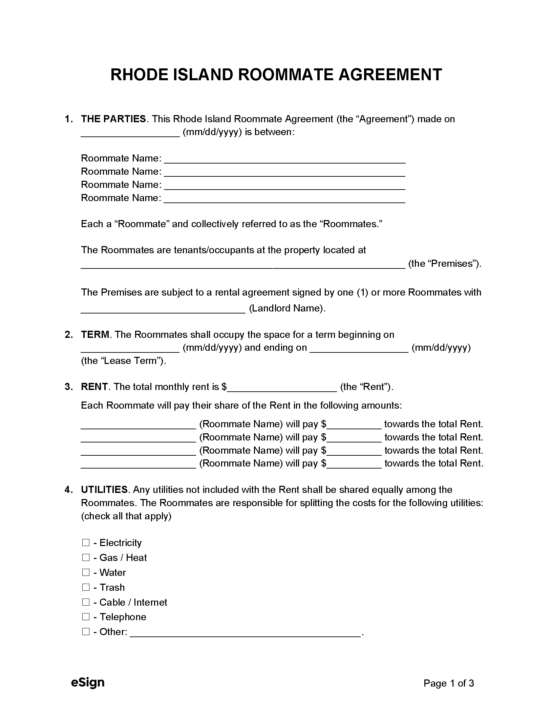 Roommate Agreement – A document that outlines the terms under which roommates agree to maintain a shared living space, including utility payments, chores, and activity restrictions. Roommate Agreement – A document that outlines the terms under which roommates agree to maintain a shared living space, including utility payments, chores, and activity restrictions.
Download: PDF, Word (.docx), OpenDocument |
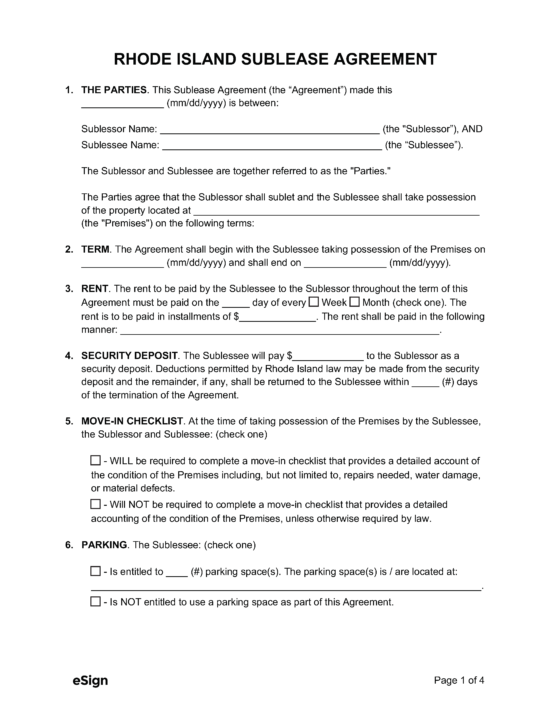 Sublease Agreement – A contract between a subtenant and a tenant allowing the subtenant to sublease (rent) the rental property. Sublease Agreement – A contract between a subtenant and a tenant allowing the subtenant to sublease (rent) the rental property.
Download: PDF, Word (.docx), OpenDocument |
Required Disclosures (3)
- Code Violations – The landlord must notify prospective tenants of any outstanding minimum housing code violations on the property before the parties enter a rental agreement.[1]
- Identity Disclosure – The tenant must receive the name, address, and phone number of each property manager, as well as those of the owner or their representative, for the purpose of receiving service of process, notices, and demands.[2]
- Lead-Based Paint Disclosure (PDF) – If the rental unit was built before 1978, this lead paint disclosure must be distributed to the tenant by the landlord and signed by both parties.[3]
Security Deposits
Maximum Amount ($) – The tenant can only be charged up to one month’s rent as a security deposit.[4]
- Exception: A landlord renting a furnished apartment may charge an additional furniture security deposit equal to one month’s rent if the value of the furniture exceeds $5000.[5]
Collecting Interest – No state law mandates a landlord to collect interest on behalf of a tenant.
Returning to the Tenant – Security deposits must be returned within 20 days after the lease termination date.[6]
Itemized List Required? – Yes, the landlord must provide an itemized list within 20 days of the end of the lease, describing any deductions from the security deposit.[7]
Separate Bank Account? – No, there is no law that requires the landlord to keep a security deposit in a separate bank account.
Landlord’s Entry
General Access – The landlord must give the tenant 2 days’ notice before entering the rental unit.[8] The tenant may not refuse access if the landlord is there for[9]:
- Inspections
- Making repairs or renovations
- Decorations
- Supplying necessary services
- Showing the property
Immediate Access – In an emergency, the landlord can enter the rental property without the tenant’s consent.[10]
Rent Payments
Grace Period – No legislation demands a grace period before late fees can be applied to overdue rent.
Maximum Late Fee ($) – No statute governs the late fees a landlord may charge.
Bad Check (NSF) Fee – In Rhode Island, a charge of $25 may be levied for a bounced check.[11]
Withholding Rent – The tenant may arrange for repairs and deduct the cost from their rent if the landlord fails to keep the premises in a fit and habitable condition. Rent can be deducted so long as long as the landlord is notified and fails to comply within 20 days, and the cost of compliance is under $125.[12]
Breaking a Lease
Non-Payment of Rent – Once the tenant is 15 days overdue with the rent, the landlord may serve the tenant with a 5-day notice to quit.[13]
Non-Compliance – If a tenant violates the terms of their lease, the landlord may send a 20-day notice to quit, demanding they either cure the violation or leave the rental unit.[14]
Lockouts – The tenant may be entitled to damages if the landlord attempts to remove or exclude them from the premises or cuts essential services like water and electricity.[15]
Leaving Before the End Date – If a tenant abandons the unit, the landlord must send them a certified letter, giving them seven days to reply. Afterward, the landlord may make every reasonable effort to re-rent the property. The tenant will only be liable for the due rent until the landlord finds a replacement.[16]
Lease Termination
Month-to-Month Tenancy – The landlord may terminate the lease with a 30-day notice to quit.[17]
Unclaimed Property – If the tenant abandons the rental unit leaving behind personal property, the landlord should attempt to contact them and store the property for a reasonable amount of time.[18] If evicted, the tenant will be responsible for the cost of moving and pre-paid storage costs.[19]
Sources
- § 34-18-22.1(b)
- § 34-18-20
- EPA/HUD Fact Sheet
- § 34-18-19(a)
- § 34-18-19(e)
- § 34-18-19(b)
- § 34-18-19(b)
- § 34-18-26(c)
- § 34-18-26(a)
- § 34-18-26(b)
- § 6-42-3(b)(2)
- § 34-18-30
- § 34-18-35(a)
- § 34-18-36(a)
- § 34-18-34
- § 38-18-40
- § 34-18-37(b)
- The Landlord Tenant Handbook (p.18)
- The Landlord Tenant Handbook (p.8)
